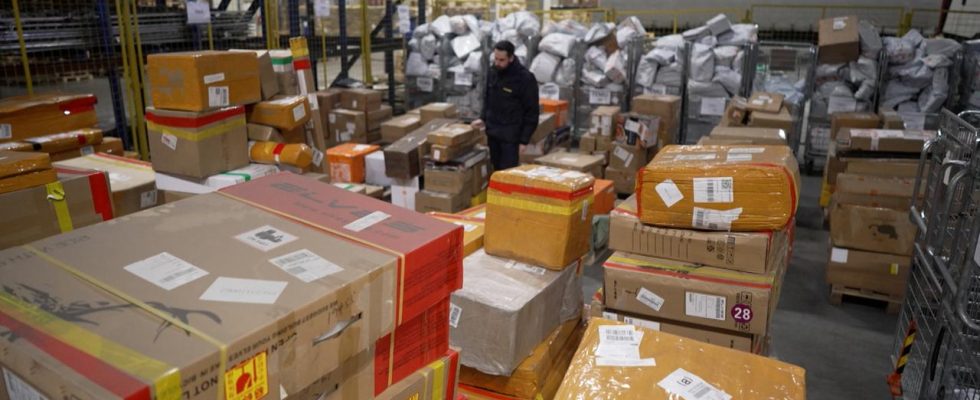background
Chinese platforms such as Temu, Shein and AliExpress ship most of their products duty-free to Europe. It’s about billions of packages a year. SWR-Research shows how online retailers exploit customs and tax loopholes.
The Belgian regional airport in Liège is now one of the largest air freight hubs in Europe. More than a million small packages arrive here from China every day. A large part of it goes on to Germany. At the 60 Belgian customs checkpoints around the airport, it is clear every day how Asian shippers are cheating.
Inspectors discover hundreds of customs tricks every day
Customs officer Murielle Mathieu checks a large square package from China. It should go to a recipient in Bavaria. It was registered as “technical equipment” with a value of 54 euros. When you open it, a 4K projector that costs 1,270 euros is revealed. An attempted fraud that is documented daily at Liège Airport. “This shouldn’t be registered as a parcel. The aim here is to save sales tax and customs fees,” said the customs officer. Parcels with a value of less than 150 euros do not have to pay customs duty when imported into Europe.
A cargo plane at Liège airport.
Another trick: separate shipments. The customs officer discovers two packages that are supposed to go to the same address in Germany. When you open it, it quickly becomes clear: it’s an order divided into two packages. “If you add up the value of the shipments, you exceed the 150 euro limit,” says Murielle Mathieu. “This was done intentionally to avoid customs duties. This is fraud.”
Cheating on Sales tax procedure
Chinese platforms use the so-called IOSS (“Import One-Stop Shop”) procedure to pay sales taxes in Europe. There are no customs fees for parcels with a value of less than 150 euros, but the so-called import sales tax must be paid.
For example, Temu and Shein are registered in Ireland. The two platforms must register the applicable sales taxes there and pay them to the Irish tax authority. Ireland then distributes the sales tax to the EU states – including to Germany if German customers have ordered something from Shein or Temu.
The German Tax Union criticizes the implementation of the IOSS procedure. “It invites fraud,” says Florian Köbler. “When the system was introduced, one should have ensured that real data exchange and control was possible between the individual countries. However, that is not the case at the moment.” According to the tax expert, the German state would miss out on hundreds of millions of dollars due to a lack of connectivity between the EU states.
“We can’t control everything”
The airport customs in Liège shows how vulnerable the European tax and customs system is. Almost 200 customs officials control the flood of packages from the Far East. “We are flooded with goods,” says team leader Thomas José. “We know that the consignors are cheating when it comes to value information. But we can’t control everything.”
In total, the EU Commission counted two billion such packages last year. The Brussels authority also assumes that 65 percent of all duty-free parcels are incorrectly declared, i.e. under-declared, in order to save customs duties and sales taxes in Europe. However, Belgian customs can hardly control the declared import sales taxes. “We have to trust the system and hope that everyone registers correctly,” says José. “However, if something is wrong, we can’t figure it out.”
A package from the Chinese trading platform Temu at customs.
Resistance in the industry
Duty-free parcels, false declarations and problems with the product safety of products – the European competitors of the online platforms are looking critically at this development. Daniel Enke heads political communications at the German fashion online retailer Zalando. Fair competition has now been suspended, he says. “We often see that regulations are not being complied with in Europe, and this cost advantage gives us a head start in the market.”
European taxpayers thus helped finance cheap products from the Far East. Daniel Enke fears negative economic effects – not only for Zalando, but for the entire industry.
EU customs reform planned by 2028
From 2022 to 2023, the import of duty-free parcels into Europe doubled. The reason for this is, among other things, the Chinese platform Temu, which has also been active in Germany since spring 2023.
The EU regulatory authorities are currently considering abolishing the 150 euro duty-free limit. A decision should be made by 2028.
For Florian Köbler from the German Tax Union, this is taking too long, especially because the customs and tax authorities are already lacking resources: “It’s absurd. We live in times of tight budgets, and the Asian platforms are probably evading millions in taxes. And we can’t do anything because our controls are failing.”

